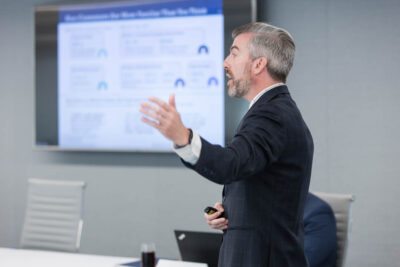Rising higher ed leaders tackle campus challenges in EAB’s fellowship
December 14, 2023, By Logan Morris, Associate Director
EAB’s Rising Higher Education Leaders Fellowship is a six-month, cohort-based experience that aims to build community, develop a depth of expertise in the topics and issues that matter most to institutional strategy, and provide focused professional skills development from EAB industry experts. Our second cohort concluded in December 2021, our third cohort wrapped up in spring 2022, our fourth occurred in fall 2022, our fifth occurred in spring 2023, and our sixth concluded in December 2024. All cohorts ended with presentations of the fellows’ capstone projects.
In each session, the fellows gained depth in new topics or terrains, developed leadership skills, and built a network with peers from institutions across the country. The topics covered included student success, budget models, change management, and more. The culminating experience for the EAB Rising Higher Education Leaders Fellowship was the capstone project that substantively contributed to the fellows’ professional advancement and helped solve a pressing challenge facing their home institutions.
In addition to the content from the subject-matter expertise and professional skills development sessions, the fellows also had access to EAB’s research library and experts, and they were paired with a partner to help develop ideas and get feedback along the way. In many cases, partners jointly completed a project that benefitted both institutions.
Below are a few of the key themes that appeared in multiple capstone projects from past participants. Scroll down to read about each of the capstone projects in the fellows’ own words.
Improve student persistence toward college and toward graduation by:
- Incentivizing faculty to engage in student advising and mentoring
- Encouraging students to develop a college-going mindset
- Offering completion and retention grants
- Making sure the right students and mentors are getting into peer mentoring programs
Encourage lifelong learning through:
- Innovative educational offerings and delivery methods
- Applying an equity lens to recruitment, programming, support, and partnerships
- Strong retention for online undergraduate programs
Embrace transformational change for the institution by:
- Becoming carbon neutral in the next two decades
- Reviewing and updating the institution’s core curriculum
- Moving the institution’s strategic goals from promise to reality
- Linking the institution’s strategic plan to academic change and the institution’s mission
Fall 2023 capstone project summaries
The fall 2023 cohorts’ capstone projects addressed a broad range of challenges in higher education. Fellows examined topics from total rewards and preparing for the future of work, to gap year programs and student success coaching.
The blog posts below are written by the participants to showcase their project and early outcomes.
Note: The views and opinions in the blog post are those of the author and do not necessarily represent the views or opinions of EAB.
Academic Affairs
Rebuilding curriculum for an interdisciplinary restructure
Elizabeth Halpin, Vice Dean, Continuing Education and Professional Studies and Undergraduate Director, Buccino Leadership Institute, Seton Hall University
Promoting faculty wellness and reducing burnout through information access and leadership education
Kimberly Grainger, Associate Vice Provost for Academic Personnel and Policy, North Carolina State University
Reimagining academic program review
David Houghton, Chair, School of Business, Oklahoma Baptist University
Analyzing data on classroom engagement to advance inclusive pedagogy
Cherilyn Lacy, Assistant Dean of Faculty, Hartwick College
Cowboy Up: Upskilling today’s learners for the future of work
Stephanie Link, Faculty Fellow for Strategic Initiatives and Associate Professor of Applied Linguistics and Technology, Oklahoma State University
Career and academic fusion: Establishment of a dedicated education unit (DEU)
Victoria Morell, Director Career Services and Talent Partner, Christ College of Nursing and Health Sciences
Business Affairs and Campus Operations
How the Colorado School of Mines approaches compensation and total rewards
Brandy Malatesta, Director, Total Rewards, Colorado School of Mines
Efficiency in higher ed: introducing the “BEST” team
Emily Weers, Executive Director, Academic Accounting & Business Services, Texas A&M University
Budget model evaluation and revision
Isho Tama-Sweet, PhD, CPA, Department Chair of the College of Business, University of Montana
Budget model evaluation and change at the University of Arkansas
Cale Fessler, Associate Vice Chancellor for Budget, Financial Planning, and Business Affairs, University of Arkansas
Develop an enterprise risk management (ERM) framework for your institution
Bruce Griffin, Chief Compliance and Risk Officer, Towson University
Safeguarding campus life: Vanderbilt University’s security approach
Patrick Retton, Associate Vice Chancellor and Chief of Operations, Vanderbilt University
Enhancing campus operations: Addressing transportation and parking issues at Lewis & Clark College
Bill Curtis, Associate Vice President of Student Life Operations & Strategic Initiatives, Lewis & Clark College
Enrollment and Marketing
The transfer credit conundrum: why are transfer applicants not yielding?
Tara Arneson, Registrar, Champlain College
Building a comprehensive prospect-to-applicant model
Jennifer Lee, Assistant Vice President for Enrollment Systems, University of North Texas
Attracting and retaining students using gap year programs
Janice Pittman, Associate Professor of Management, Union University
Leveraging institutional research in admission criteria changes
Gina King, Director of Undergraduate Admissions and Orientation, University of Maryland, Baltimore County (UMBC)
Navigating 4+1 strategies for enrollment growth: a journey of innovation and collaboration
Jaime L. Caruso, MA, Director of Graduate Admissions, Mercy University
Realigning instructional capacity with student demand: Implementing strategies to address changing enrollment patterns
Dr. Matt Applegate, Associate Dean, School of Arts and Sciences, Molloy University
Strategy
Developing a strategic plan dashboard at Eastern Mennonite University
Sara Halteman, Director of Institutional Research & Effectiveness, Eastern Mennonite University
Key factors to creating effective advisory boards or councils
Kerri Carlyon, Director of Development, Stetson University
Employee engagement through leadership development
Kristen Craig, Interim Dean at Saskatchewan Polytechnic
First moves: Implementing Western’s global engagement plan
Nancy Stewart, Executive Director and Senior Advisor to the President, Western University, London, Ontario, Canada
Student Success and Well-being
Exploring and initiating a well-being model for East Tennessee State University
Michelle Byrd, Associate Vice President and Dean of Students, East Tennessee State University
Advancing access and outcomes: admissions and advising for first-generation graduate students
Robert Lyons, Director of Academic Programs & Operations, Georgetown University
Exploring strategies to improve student success in an accelerated weekend program
Kathleen Apollon-Ferron, RN MSN CCRN, Program Director, Undergraduate Nursing Weekend Program, Mercy University
How UNC Charlotte created a Coordinated Care Network to manage student success campaigns
LeeFredrick Bowen, Director of Advising System, University of North Carolina at Charlotte
Elevating advising at Butler University
Robbie Lopez-Shue, Executive Director, Student Success, Butler University
Assessing student success coaching at Kansas Wesleyan University
Joseph Koons, Assistant Vice President for Student Engagement and Success, Kansas Wesleyan University
Spring 2023 capstone project summaries
The fellows in the spring 2023 cohort tackled a variety of campus problems with their capstone projects. Projects addressed topics such as annual giving, student retention, professional and continuing education, academic program planning, and more.
The blog posts below are written by the participants to showcase their project and early outcomes.
Note: The views and opinions in the blog post are those of the author and do not necessarily represent the views or opinions of EAB.
Academic Affairs
Improving completion rates in gateway courses: Applying a root cause analysis model and equity lens
Betsy Dunn-Williams, Dean of Academic Success, Campbell University
Academic transformation framework implementation: Enhancing professional practice in higher education
Dr. Denise Brown, Associate Dean of Health Sciences, The Christ College of Nursing and Health Sciences
Administration of cross-college interdisciplinary academic programs
Jamie Dyer, Interim Dean of Interdisciplinary Studies, Mississippi State University
Necessary infrastructure to support interdisciplinary programs
Kimber McKay, Interim Vice Provost for Academic Affairs, University of Montana
Assessing online courses—OSCQR rubric
George Rus, Assistant Dean for Online Education, University of Colorado at Colorado Springs
Implementing a caseload management model in a newly centralized division
Melissa Grant, Associate Dean of Advisement, Office of the Provost, Pace University
Advancement
Activating and retaining undergraduate alumni as annual donors
Margo Thomas, Executive Director of Alumni Engagement and Annual Giving, Stetson University
How the University of the Ozarks engaged local alumni
Brian Henderson, Director of Annual Giving and Alumni Engagement, University of the Ozarks
Enrollment and Marketing
Increasing adult learners’ success: Retention and belonging
Barbara Andrew, Honors College dean at William Paterson University of New Jersey
Finding new ways to recruit the ever-elusive non-athlete
Conner Ellinghuysen, Director of Admissions, Buena Vista University
Developing an undergraduate student retention strategic plan
Donna Mohr, Director of Student Retention, Lehigh University
Re-Envisioning a Doctorate of Nusing Practice (DNP) program
Daisy Sherry, Associate Dean, College of Nursing & Health Sciences, Lewis University
Strategy
UMBC’s journey to better staff recruitment
Kelly Coleman, HR Director, University of Maryland, Baltimore County
Design strategy for continuing and professional education at the University of Texas at Dallas
Lance K. L. Bennett, Associate Director of Assessment and Accreditation, Office of Institutional Success and Decision Support, the University of Texas at Dallas
Student Success
Exploring the impact of high school course rigor on student success in college
Mary Venezia, Chief of Staff, Enrollment Management, University of Arizona
Trauma-informed practices in higher education: Building support communities from the top down
Joanna Krueger, Associate Professor of Chemistry, UNC Charlotte
Enhancing a sense of belonging in the classroom
Dr. Anisa Hansen, Professor of Pharmacy Practice and Director of Diversity, Equity, and Inclusion for the College of Pharmacy and Health Sciences, Drake University
Fall 2022 capstone project summaries
The fellows in the fall 2022 cohort tackled a variety of campus problems with their capstone projects. Projects addressed topics such as program review, data strategy, budget models, enrollment growth, and more.
The blog posts below are written by the participants to showcase their project and early outcomes.
Note: The views and opinions in the blog post are those of the author and do not necessarily represent the views or opinions of EAB.
Academic Affairs
Going beyond program review: Utilizing converging data sources to strategically assess departments
William Chura, Associate Provost for Research and Educational Effectiveness, Lewis University
Faculty orientations and continuing a culture of mentoring
Kristen McCauliff, Associate Provost for Faculty Affairs and Professional Development, Ball State University
Oklahoma cooperative extension service: Family and consumer sciences
Gina Peek, Associate Dean, Extension Engagement and Continuing Education, Oklahoma State University
Business Affairs
IT project intake and institutional prioritization process
Jennifer Ferfolja, CBAP, PMP, Director, ICT Enterprise Solutions and Projects, Wilfrid Laurier University
Graduate assistantship budgeting and growth model
Jordan Johnson, Associate Provost, Business Affairs and Analysis, University of Alabama
Developing a budget forecasting model and budget dashboards at Buena Vista University
Courtney Berg, Director of Finance & Administration/Controller, Buena Vista University
Lehigh University’s data strategy: A roadmap to a university’s analytics transformation
Yenny Anderson, Vice Provost for Institutional Research and Strategic Analytics, Lehigh University
Enrollment and Marketing
Louisiana State University’s “Strategize Your Summer” initiative
Anna Bartel, Assistant Vice Provost for Academic Programs and Strategic Analytics, Louisiana State University
Growing undergraduate online enrollment
Michael Harrington, AVP, Strategic Enrollment Services, Drexel University
Enrollment design project: The student experience from admission to alumni
Heather Veeder, Assistant Vice President of Student Success, Policy, and Planning, Eastern Washington University
Improve the precision of student enrollment forecasting
Jeff Pidcock, Director of Budgeting and Business Transformation, Miami University
Strategy
Controlling the narrative at Howard University
Joanne R. Pluff, AVP of Student Experience, Howard University
An agile solution to higher ed problem solving
Kimberly Langolf, Chief of Staff, Finance and Administration, University Affairs, University of Wisconsin Oshkosh
Student Success
Removing institutional barriers to student success
Andrea Mostyn, Director of Strategic Communication, Missouri State University
The ever-persistent ROI question: What is my degree worth?
Dr. Tori McLean Good, Executive Director of Career Development, Converse University
University Research
Supporting research in a world of finite resources
Christopher Tycner, Associate Dean of College of Science and Engineering, Central Michigan University
Spring 2022 capstone project summaries
The fellows in the spring 2022 cohort used their capstone projects to explore an array of challenges. Many tackled improving student success, retention, and equity at their institutions, while others focused on budget models and streamlining administrative processes.
The blog posts below are written by the participants to showcase their project and early outcomes.
Note: The views and opinions in the blog post are those of the author and do not necessarily represent the views or opinions of EAB.
Advancement
Advancing the culture of philanthropy on campus by engaging employee support
Emily VanderWoude, CFRE, Director of Leadership Giving, Hood College
Academic Affairs
Supporting writing instruction in STEM courses
Megan Brown, Director of Writing, Drake University
Business Affairs
Budget alignment and transparency in higher ed
Russ Hannah, Ed.D., CPA, CGMA, CGFM, Chief Financial Officer, Arkansas State University
Expanding higher ed leadership competency to increase employee satisfaction, decrease risks and reduce costs
Raymond Hess, Director of Human Resources, Colorado School of Mines
Optimizing the policy development process in the University of Wisconsin System
Stefan Fletcher, Director of Administrative Policy, University of Wisconsin System
Managing the identification and adoption of a new budget model
Sandy Cavi, Associate Vice President for Budget & Planning, Illinois State University
DEIJ
A WISE (women in science and engineering) approach to STEM
Christine DeWolf, Professor and Vice-Dean, Concordia University
Anti-racism training in medicine: strategies for all learners
Jocelyn Mitchell-Williams, M.D., Ph.D., Cooper Medical School of Rowan University
Fostering sense of belonging among Black undergraduate students
Melissa McGuire, Ph.D., Associate Vice President for Student Affairs, University of North Texas
Developing tools to support campus DEIJ initiatives
Winston Roberts, Assistant Vice President for Student Services, Seton Hall University
Enrollment and Marketing
Enrollment management strategies to win market share
Darlene Dilley, Associate Provost for Enrollment Management, Utah Tech University
Centralizing noncredit enrollment management
Josh Goldman, Director of Conference Centers, University of Wisconsin-Madison
Student Affairs
Elevating student employment experience to a high-impact practice
Mary Anderson, Director, Career Services, The College of St. Scholastica
Student Success
Improving success for pre-health students
Joe Fritsch, Ph.D., Divisional Dean of Natural Science, Seaver College, Pepperdine University
Where and when grant-funded interventions can increase student retention
Dan Regan, Associate VP for External Relations, College of Mount Saint Vincent
Graduate financial aid practices that best serve students
Stevie Dunphy, Director of Business and Finance, Office of Student Financial Services at Georgetown University
Eliminating the shuffle: reviewing the coordination of first-year advisors, coaches, and counselors
Carlos R. A. Jones, MFA, Associate Dean of Arts and Sciences and Coordinator of Africana Studies, SUNY College at Buffalo
Increasing course completion rates through faculty development in student engagement pedagogy
Michele Atkins, Professor of Education and Assistant Provost for Accreditation and Research, Union University
Optimizing success for students who change campuses
Eric Bielefeld, Professor of Speech and Hearing Science, The Ohio State University
Supporting transfer student enrollment and completion goals Identifying factors that influence course success rates
Tracey Baham, Ph.D, Assistant Vice President, Institutional Strategy & Effectiveness, Mississippi State University
University Research
Supporting undergraduate research and challenging assumptions
R. Gabe Cavazos, Assistant Vice President for Research Data and Information Systems, University of Texas at Dallas
2021 capstone project summaries
The 66 fellows in the 2021 cohort tackled a wide range of issues in their capstone projects, reflecting the diversity of institutions and professional experiences of the participants. Several fellows deeply examined student success at their institutions, specifically focusing on equity issues. Others made recommendations for improving campus sustainability, building stronger online programs, and adjusting graduate tuition rates.
The blog posts below are written by the participants to showcase their project and early outcomes.
Note: The views and opinions in the blog post are those of the author and do not necessarily represent the views or opinions of EAB.
Academic Program Planning
Academic program stewardship
Joe Bruner, William McDonnell and Sarah Simpson, University of Kentucky
Building a department chairs’ academy—no longer a forgotten chair
Cynthia Lester, Senior Associate Dean of Academic Affairs, Georgia State University Perimeter College
Cross-departmental collaboration for innovation and impact
Paula Mills, Chief of Staff and Operations, College of Agricultural Sciences, Colorado State University
Fiscal literacy for department chairs
Joe Lewandowski, Director of Resource Planning, University of Buffalo
How academic units can show alignment with and measure progress towards university goals
Colleen Karnas-Haines, Director of Assessment, Planning, and Accreditation, The University of North Carolina at Charlotte
Rethinking the academic affairs organizational structure
Nina Bates, Director of Operations and Strategic Initiatives, Office of the Provost, University of Arizona
Business Affairs
Evaluating opportunities for external partnerships
Emily Hochstatter, Director of Risk Management and Administrative Initiatives, Northern Illinois University
How is burnout related between faculty, staff, and students?
Terry Longshore, DMA, Chair/Professor of Music, Southern Oregon University
Improving employee engagement through continuous feedback
Alana Lardizabal, Director of Human Resources, Southern Oregon University
Streamlining internal hiring processes and procedures through process improvement
Breanne Holloway, Assistant Director of Organizational Development and Learning, Ball State University
DEIJ
Improve campus DEI responses through practice discussions
Shelley Fairbairn, Professor of Education, Drake University
Building a purposeful DEIJ infrastructure at Mercy College
Andrés Matías-Ortiz, Interim Dean, School of Liberal Arts, Mercy College
Developing best practices for equitable faculty hiring
Amy Walker, University of Texas at Dallas
Making an institution a “first choice” for underrepresented students
Mario Silva-Rosa, Director for Undergraduate Admission, Bentley University
Strategies for improving graduate DEIJ enrollment pipelines
Lionel Wright, Associate Interim Dean, Athens State University
Enrollment and Marketing
Adult learners and strategies for success
Christopher Cuccia, Ed.D., Associate Provost for Academic and Graduate Affairs, Seton Hall University
Melissa McCauley, Director of Marketing, Wilfrid Laurier University
Enhancing the attractiveness of joint undergraduate and graduate degrees
Coutney B. Smith, Seton Hall University
Finding and recruiting adult learners
Jordan Lindsey, Director of Admissions, Corban University
Amy West, Assistant Vice President of Marketing and Brand Strategy, Bowling Green State University
Facilities
How to explain facilities impacts at the institution level and obtain buy-in
Jen Cox, Missouri State University
Jeremy Davis, Miami University—Ohio
Tanara Teal-Tate, University of Wisconsin—Madison
Student Affairs
How can universities promote access to wellness resources for students?
Shankar Munusamy, Drake University
Erin Van Daalwyk, University of Wisconsin-Green Bay
Conducting a diversity and equity campus climate survey
Dr. Chassidy Cooper, PhD, Coordinator for Equity and Inclusion, East Tennessee State University
How to communicate financial information to Gen Z students
Jacqueline Gatlin, Bursar, University of Colorado Denver | Anschutz Medical Campus
Melissa Dingman, Director of Scholarship and Financial Aid, Minnesota State University Moorhead
Increasing campus climate survey response rate
Dr. Kacee Ferrell Snyder, Director of the Center for Women & Gender Equity and Co-Director of the Center for Violence Prevention & Education, Bowling Green State University
Student Success
Building the “FirstGen Presidential Fellows” program at Bentley University
Jane De León Griffin, Associate Dean of Arts and Sciences, Bentley University
Campus communication onboarding guide for new students
Grace Gardner, Director of Academic Affairs, Missoula College, University of Montana
Lexi Stoneburner, Assistant Director of Admissions & Visitor Experience, Converse University
Improving student enrollment and retention through on-campus employment and career development
Erica Wagner, Associate Dean of Undergraduate Programs, Portland State University
Improve student success through digital and technological engagement
Marianne Young, Assistant Vice President for Student Development & Support, University of Kentucky
Carrie Stockton, Associate Vice President of Student Success & Academic Engagement, Biola University
Investments to improve student comfort, success, and retention
Scot Rab, Interim Dean of Academic Affairs for the College of Environment, Forestry, and Natural Science at Northern Arizona University
Motivate faculty to contribute to student retention
Ann Amicucci, University of Colorado, Colorado Springs
Supporting transfer student enrollment and completion goals
Megan Scherzberg, Director of Orientation, Transition, and Retention, Metropolitan State University of Denver
Roberto Vasquez, Sr. Director for Transfer & Pathways, Central New Mexico Community College
University Research
Optimizing institutional resources for research growth
Nick Hagemeier, Interim Vice Provost for Research, East Tennessee State University

More Blogs

What 30+ rising higher education leaders learned in EAB’s fall 2024 fellowship

Building capacity for one of higher ed's unsung heroes—academic deans
